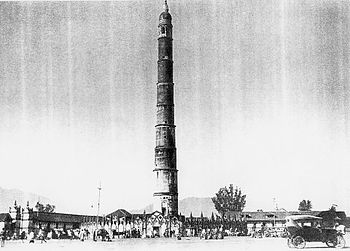 |
| English: Kathmandu. (Photo credit: Wikipedia) |
When the tragedy hit, I was too far away - 10,000 miles - to be able to claim trauma. But I was in
shock for a few days. I could not believe. The
Dharahara toppling was too powerful a metaphor for all the damage that might have happened before the reports came in.
One of the decisions I took was I was not going to make political statements for a few weeks. But very soon I realized the Corruption And Criminal Complex (CCC) on the ground was in no mood for a timeout. Quite the opposite, it was gearing to go on a hyperdrive. And I have come to the conclusion that this actually is the perfect time to be talking politics. Because the CCC is hellbent on messing up the relief work. And if that happens, the world is not going to pour in money for the reconstruction work. And so
now is the time.
Nepal should not see a
Haiti repeat. There also one of the first local moves was to collect all the incoming money into one account. After that the local elite went on a looting spree. That messed up the reconstruction possibilities.
And so now is the time for all concerned Nepalis to step in and hold the local political class accountable. Money will not be a problem. Money will come in, if not from governments then from ordinary citizens across the world. But that faucet will turn itself off if
100% online transparency is not ensured for all the money coming in.
Relief supplies left stranded at the airport: that also has a parallel in Haiti. The local elites there did that to send a message to the international donors. Don't send us stuff. Send us cash. It worked. They started sending cash. Cash is much easier to loot. There's all sorts of creative accounting you can engage in.
The one bank account all money is supposed to go to: that also has a parallel in Haiti.
Foreign governments are not above the 100% online transparency idea. When they pledge $10 million, what they mean is $5 million will go to their own nationals they need to hire, another $3 million will go to buy stuff in their own country. Of the remaining $2 million, the local elites will gobble up about $1.5 million. 500K is no pocket change, would you say?
Sushil Koirala is not that innocent. He might have walked into the Prime Minister's Office with only three cell phones to his name. (Why three?) But the PMO stinks. There is a large coterie of people who need Sushil to stay PM and come back as party president, because otherwise their wells start running dry.
Bamdev Gautam is the epitome of the Corruption Criminal Complex (CCC). The guy stinks through and through. If you want the worst for the Bahuns of Nepal, you would wish for them to have Bame as their leader forever. This guy vandalizes the entire administration. His underlings can't get promotions unless they show up at his residence with suitcases. His ties to the mafia are open, when he is in power, and when he is not in power. He wants the Home Ministry each time because that is where he is the most useful to the mafia.
KP Oli is uneducated and corrupt and verbose. That is an amazing cocktail of stink. His house is bigger than the Prime Minister's residence. And he won his first election only recently. He sure is no businessman.
Ram Sharan Mahat might be an economist, but he is a corrupt economist. He bought a new car for the Finance Minister, a very expensive one, only a few months back. It was not because the Finance Minister did not have a car. On the books it might look legitimate, but that is only the tip of the iceberg. When in New York last time, he organized a gathering of Bahuns to tell them, "We should corner the Madhesis and the Janajatis to the max!" This guy is not only corrupt, he is also a racist. Those are not two separate character flaws. They go hand in hand.
The list goes on and on.
They are already messing up relief work. They will thoroughly mess up the reconstruction work unless
something is done by the concerned Nepalis across the world.
This is not only the perfect time to be talking politics, this is also the perfect time to be talking corruption. This also is the perfect time to be talking federalism. Precisely because Sindhupalchok is a Tamang (Janajati) stronghold did help took forever to get there. In a federal setup, there would have been lesser need to look to Kathmandu for help.
A commitment to
100% online transparency put in place by a bill passed by the national parliament will also make sure Nepal stays hot news through social media, because it is only a matter of days before some idiot blows up some cafe somewhere and global media moves on, and Nepal is forgotten by the world.






































